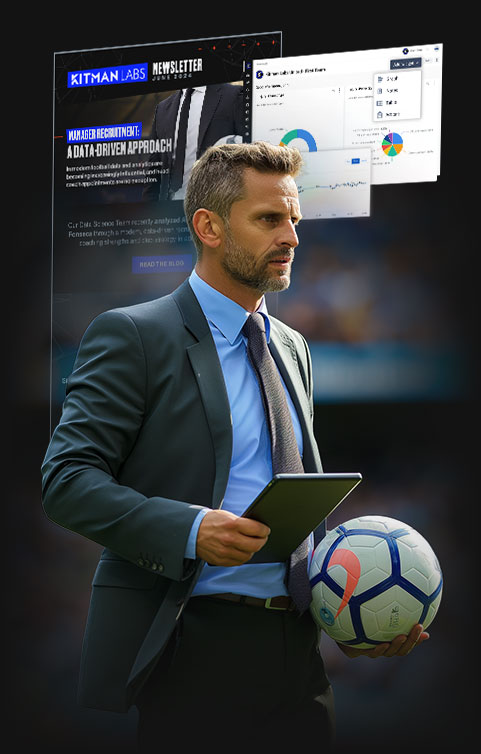By Maxime Settembre, Dr. Martin Buchheit, Willian Mendes and Dr. Derek McHugh
The 2022/23 season promises to be special. With a World Cup programmed from November 20th to December 18th, 2022, the governing bodies had to modify the schedule of the domestic leagues and cups as well as European and international competitions. On the other hand, for some leagues such as Major League Soccer the situation is reversed as this World Cup occurs after a full season.
In the case of the top 5 European leagues, the season started earlier and/or will end later compared to the previous one, which leads to a 2-to-3-week increase of its duration (Table 1), while having to stop for at least 6 weeks during the World Cup (Table 2).
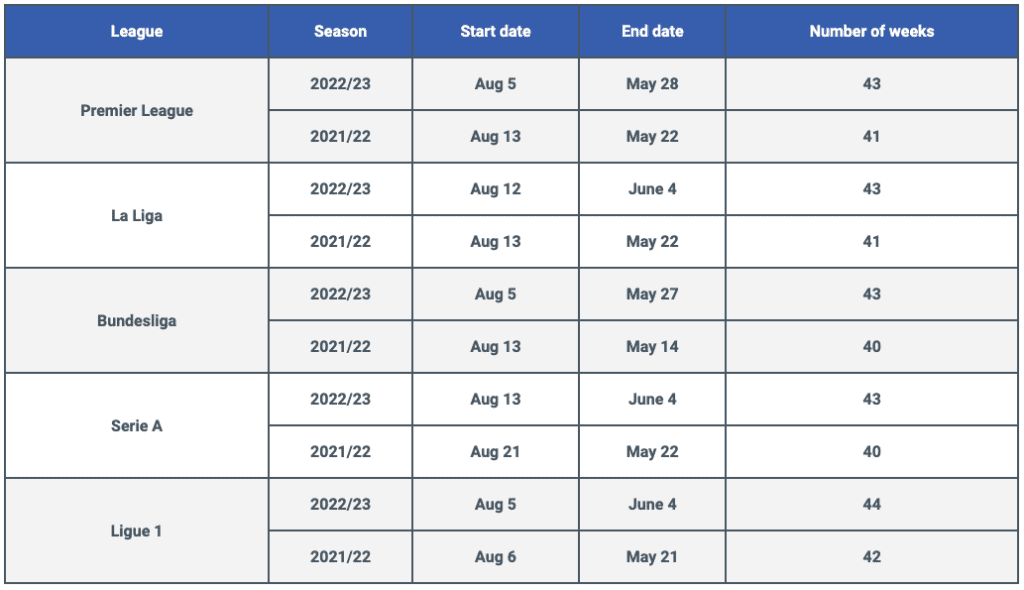
Table 1. Start and end dates of the 2021/22 and 2022/23 seasons for the top 5 European leagues. The number of weeks between those 2 dates is also added.
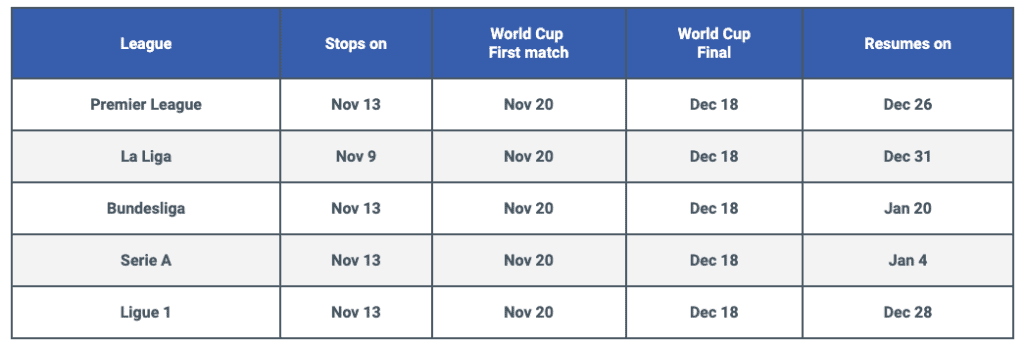
Table 2. Dates when each of the 5 top European leagues stops before the World Cup and resumes after it. The dates of the first and last matches of the international competition are also added.
This situation then raised several concerns within the industry. Many coaches have complained 1 that with the season being squeezed, fixture congestion will increase throughout it, especially before the World Cup, which may negatively influence the players health and performance.
As it is too early to evaluate this impact, we decided to start with a focus on what we know so far: the individual players’ schedule and the frequency and density of matches that they may have to play leading to the World Cup.
Summary of topics covered
- Context
- Is the first part of the ‘22-’23 season more congested than the previous?
- Some players will not necessarily have to be prepared differently
- Similar congestion level, different dynamics
- Less congested does not necessarily mean less dangerous
- Coming through!
- Breaking the chains
- An unusual season can be more stressful.
- Time will tell!
Context
Data
In order to examine their schedule from a preparation perspective and knowing that most of the matches from this season have not yet been played, we considered the matches that are scheduled to be played with both their club and national team, without taking the number of minutes played into account.
Looking at this from a preparation standpoint, the match dates are the ones initially scheduled at the start of the season.
All data was sourced from Transfermarkt 2
Period
We compared this season’s schedule from its start to the end of the World Cup group phase (December 5th, 2022) – the knockout stage matches currently being unknown – with last season’s schedule until the same period.
Selected players
We considered 15 world-class football players playing for clubs across several European leagues and national teams across multiple continents: Karim Benzema*, Alphonso Davies, Kevin De Bruyne*, Jordan Henderson*, Harry Kane, Joshua Kimmich*, Kylian Mbappe, Lionel Messi, Luka Modric, Neymar Jr.*, Pedri*, Son Heung-min, Virgil van Dijk, Vinicius Jr. and Kyle Walker.
Due to a high number (40+) of days missed due to an injury/illness during the period observed, we excluded the players with an * from the case studies.
Clash between club and national team schedules
For non-European players, some matches with their national teams and clubs took place at or around the same time and we excluded the matches that the players could not play e.g. Lionel Messi did not play against Clermont Foot on September 11, 2021 and SCO Angers on October 15, 2021 as he was playing with Argentina, in Buenos Aires against respectively Bolivia and Peru for the World Cup Qualifiers.
Congestion
Congestion is measured as any match occurring after at most 3 full recovery days from the team’s previous match. For instance, if a team plays in the Champions League on Tuesday and then again in the Premier League (PL) on Saturday, the PL match is congested, Wednesday, Thursday and Friday being the 3 full recovery days. If they play in the PL on Sunday instead, it is not congested.
Congestion chains refer to consecutive matches in which all matches are congested. Here is the colour palette we used to represent the number of matches in a row within the chains :

*: non-congested match
Is the first part of the 2022/23 season more congested than the previous one?
When looking at the selected 15 players together, this season’s schedule until the start of December compared to last season creates (Table 3):
- Slightly less congestion chains but those are more severe on average
- A similar number of congested matches

Table 3. Descriptive statistics about congestion during the first part of the 2021/22 and 2022/23 seasons, considering the data from the 15 selected players : total number of chains and congested matches, and average, median and maximum length of the chains. Those numbers are based on the players calendar and not on their actual minutes played.
Some players will not necessarily have to be prepared differently
Within the 9 selected players, only Kylian Mbappe does not seem to be impacted by a potential calendar squeeze. For the French Golden Boy, the first part of this season is even less congested than the previous one (Figure 1).
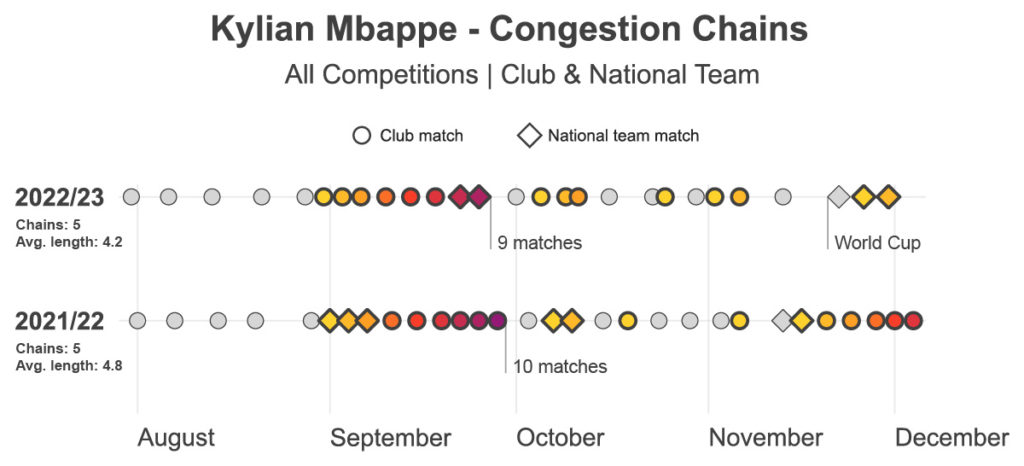
Figure 1. Kylian Mbappe’s congestion chains during the first part of the 2021/22 and 2022/23 seasons, including all the competitions played by his club and national team. The numbers are based on his calendar and not on the actual minutes he played.
Similar congestion level, different dynamics
While the Real Madrid Ballon d’Or winner Luka Modric could face a slight increase in the number of congestion chains along with a slight decrease in their average severity, the contrary could occur for the Premier League stars Kyle Walker and Virgil van Dijk, notably the latter with an unusual 11-match chain before the start of the World Cup (Figure 2).
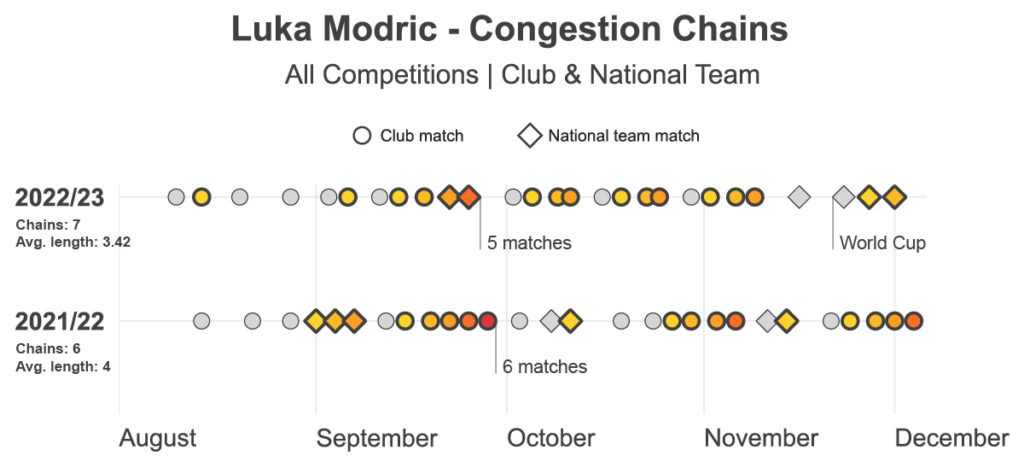
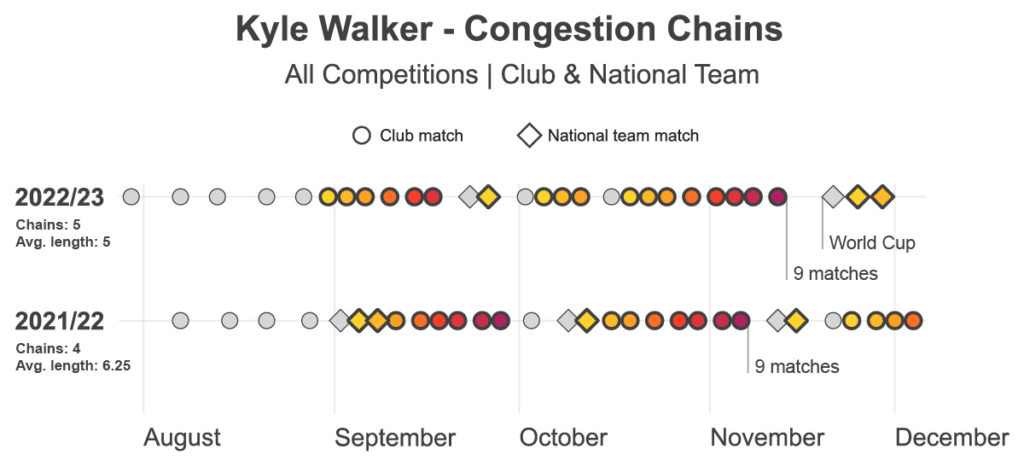
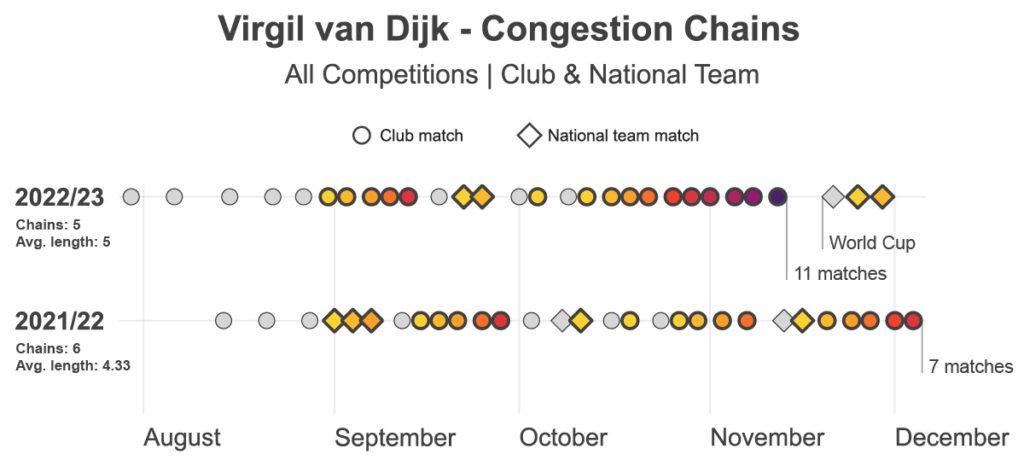
Figure 2. Luka Modric, Kyle Walker, and Virgil van Dijk’s congestion chains during the first part of the 2021/22 and 2022/23 seasons, including all the competitions played by their club and national team. Those numbers are based on their calendar and not on the actual minutes they played.
Less congested does not necessarily mean less dangerous
Whereas Harry Kane, Son Heung-min and Alphonso Davies could suffer less congested matches this season than the previous one, those chains could be significantly more severe, especially for the South Korean Premier League Golden Boot winner with a potential colossal 15-match chain – the longest one within our dataset (Table 3) – before the start of the World Cup (Figure 3).
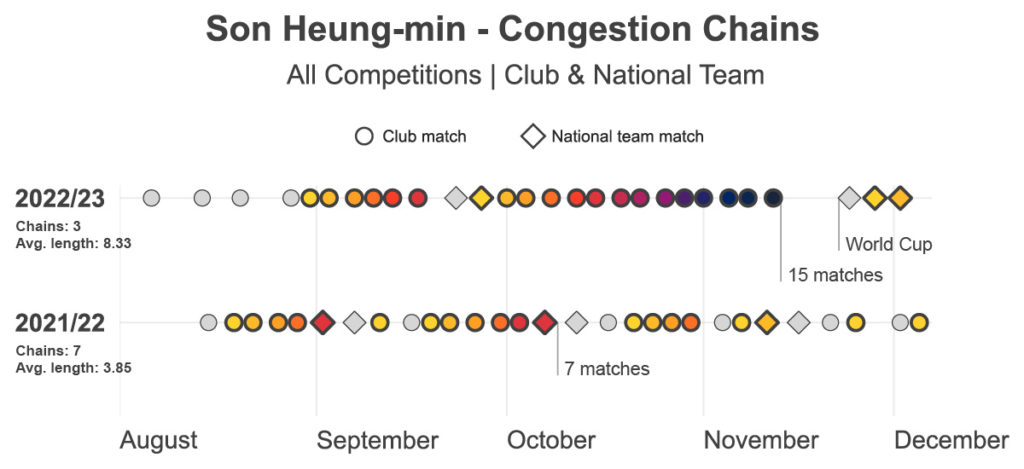
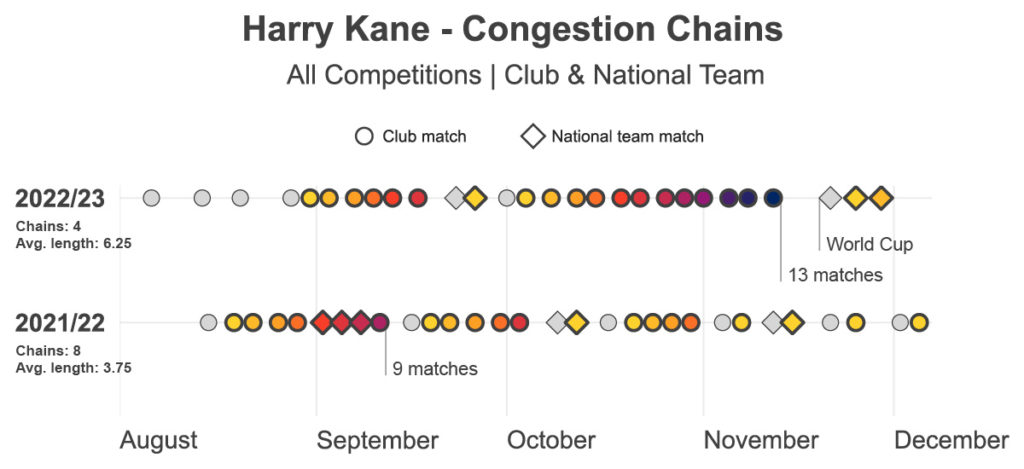
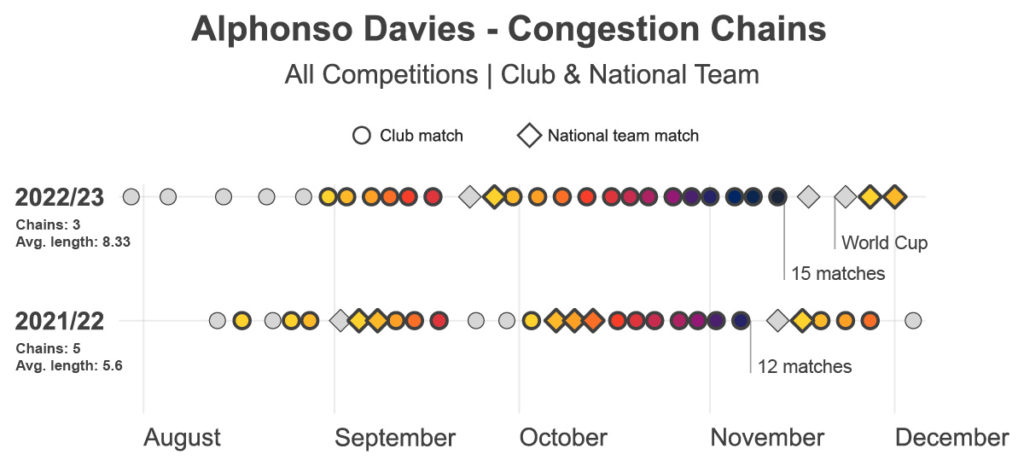
Figure 3. Son Heung-min, Harry Kane, and Alphonso Davies’s congestion chains during the first part of the 2021/22 and 2022/23 seasons, including all the competitions played by their club and national team. Those numbers are based on their calendar and not on the actual minutes they played.
Coming through!
Lionel Messi and Vinicius Jr. are the last 2 players of our case study and they are not going to be the ones with the easiest potential schedule (Figure 4). As opposed to his teammate at Paris-Saint-Germain (PSG), the 7-time Ballon d’Or winner could notably have to deal with a 14-match chain from the end of August to mid-October. This difference is mainly due to Argentina playing against Jamaica on September 28, 2022, 3 days before PSG’s Ligue 1 game against Nice, which keeps his chain active, whereas France’s last game of this international window is against Denmark on September 25, 2022.
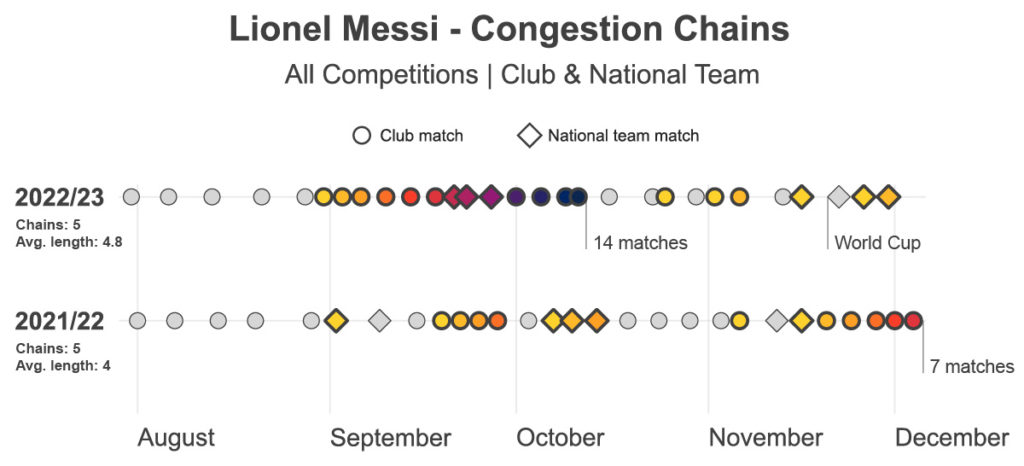
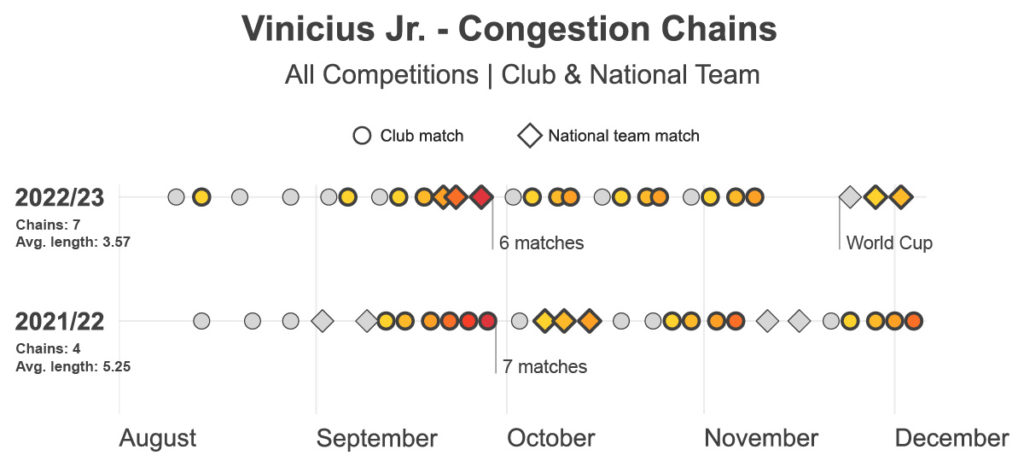
Figure 4. Lionel Messi and Vinicius Jr.’s congestion chains during the first part of the 2021/22 and 2022/23 seasons, including all the competitions played by their club and national team. Those numbers are based on their calendar and not on the actual minutes they played.
Overall, this mid-season World Cup will not create an important change in terms of congestion during the pre-World-Cup period.
However, some individual players may be more impacted than others compared to their previous season, even if they both play in the same club as we observed with Kylian Mbappe and Lionel Messi. This suggests that team management and rotations should be always considered at the player level.
Breaking the chains
The schedule represents the worst case scenario in terms of congestion. However, It is up to coaches to wisely manage their players. Whereas rotating their squad fixes the issue related to accumulated fatigue throughout the repeated fixtures, it also introduces a loss of team dynamics and potentially impairs performance. The managers also want to play their best players during the most important matches, which makes rotation more challenging and congestion chains more severe. Better preparation to build more resilient players, and a better recovery process are 2 components that could help them minimise this effect.
An unusual season can be more stressful
Even for the players who got a similar calendar to their one during last season, the start of this one could be still different. It is difficult to deny the psychological impact of having to be healthy and in shape for the most important competition, while having to play and perform during a large number of matches 3.
With only approximately a week of preparation between the stop of the domestic leagues and the start of the World Cup, the pressure of suffering an injury – that could prevent them from playing it – is even greater.
On top of this special first part of the season, the after-World-Cup period promises to be at least as challenging. A second “pre-season” will occur before the restart of the leagues and, depending on whether the athletes played the World Cup and how far they go through, they will join it at different moments. Considering both the fatigue and mental impacts of the World Cup, the staff will have to rule on how long they should wait before incorporating their players into their squad again. As what Liverpool F.C. experienced after the dramatic final of the last Africa Cup of Nations 4, this will not be straightforward.
Time will tell!
Whilst the above comments are hypothetical, a look back on both injuries and performance including the actual minutes played in order to analyse the impact of this uncommon season will be worth digging into at the end of this season.
Special thanks to Ryan King, Karim Hader, Allan Munro and Darcy Norman for their contribution to this project. Stay tuned for more exciting content from the Performance Intelligence Research team.
References
- Klopp, Pep, other coaches have complaints about World Cup moveBy Jennifer Bubelhttps://en.as.com/soccer/klopp-pep-other-coaches-have-complaints-about-world-cup-move-v/
- Transfermarkthttps://www.transfermarkt.co.uk/
- A congested football calendar and the wellbeing of players: correlation between match exposure of European footballers before the World Cup 2002 and their injuries and performances during that World CupBy J Ekstrand, M Waldén, M Hägglundhttps://bjsm.bmj.com/content/38/4/493
- Mohamed Salah will return to Liverpool earlier than Sadio Mane after AFCON final heartacheBy Tom Victorhttps://www.irishmirror.ie/sport/soccer/salah-mane-liverpool-return-afcon-26158175



